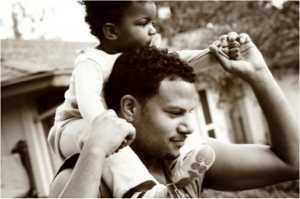I wrote the op-ed below around Father’s Day. I was inspired by how much (positive!) coverage I was seeing of men as Dads in the media, but I also wanted to question how the way we talk about men as fathers limits the way we think about and respond to them.
Twenty years ago, the stay-at-home father was a curiosity, a spectacle, viewed with a mixture of suspicion and praise. I know this because I began to conduct research on these men two decades ago. They were hard to find and reluctant to speak about being the odd man out in a sea of mothers or what one father called “estrogen-filled worlds.”
Today, stay-at-home dads are everywhere. They walk proudly with their babies in slings; they’re daddy bloggers creating online and community dad groups; and they’re injecting a male presence at library story time and infant play groups. Television programs, such as Modern Family, Up All Night, and Parenthood, portray stay-at-home dads as smart, handsome, willing, and content. And high-profile women such as Meryl Streep, Angelina Jolie, Christiane Amanpour, and Sarah Palin all live with men who have been called, or call themselves, stay-at-home dads.
The term ‘stay-at-home dad’ (SAHD) is part of our 21st century discourse and is used in a taken-for- granted manner by academics, journalists, and bloggers. The term is important. It signals a radical shift in traditional gendered forms of breadwinning and caregiving. Yet I think it’s time to re-think the stay-at-home dad label.
…Read the rest of the op-ed here.



